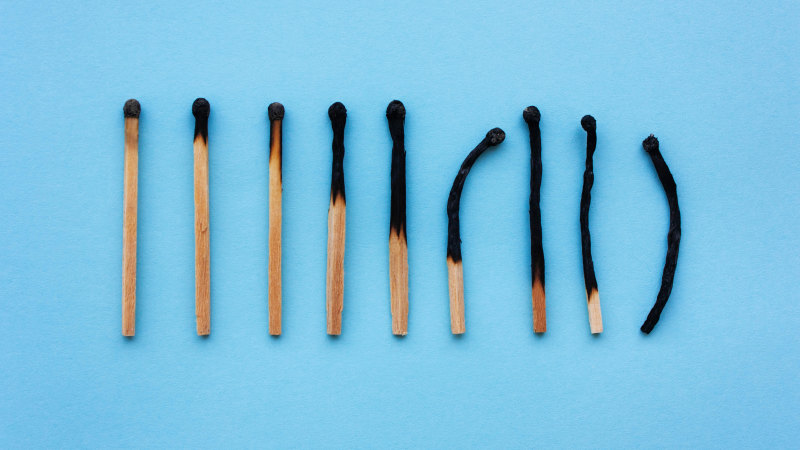When his sleep tracker told him he was only averaging 70 per cent sleep quality last year, robotic specialist surgeon Dr Chrys Hensman knew he wasn’t functioning optimally.
Aware of the health and performance implications of subpar sleep quality, he tried to ignore these signs to simply keep his head above water while battling the stress of working amidst COVID-19 healthcare pressures, caring for a sick child, researching medical robotics and mentoring young surgeons.
There are plenty of early signs that you could be suffering from burnout.Credit:iStock
He’d cut back exercise, stopped enjoying playing guitar and was questioning his research commitments in a bid to find some breathing space.
“I would wake up at night feeling a sense of dread and have recurrent thoughts about [my inability] to switch off. I worried incessantly about trivial matters and the panic of losing control,” he says.
“I knew there was a problem but the ‘lightbulb’ moment was really my family saying, ‘You’re not present’. My wife said, ‘There are times when I’m addressing you and you don’t seem to be paying attention.”
Dr Hensman sought help from mindfulness coach Melo Calarco, who says he was unique in that he saw the subtle signs of burnout before it was so bad that his relationships were destroyed, or he was crippled by panic.
One of the biggest causes [of burnout] I see is that they’re always ‘on’ mentally, and they don’t give themselves permission to take a break.
“I interviewed around 200 people who had experienced burnout, and 90 per cent didn’t know they were burning out until it was too late – they experienced a panic attack or a physiological response or some kind of crisis point,” says Calarco, author of Beating Burnout, Finding Balance.
Check your energy levels
Calarco wishes more people were aware of the early signs of impending burnout, so they could take steps to rectify it before their family life suffers, or they’re donning a hospital gown.
“Signs of burnout are feeling foggy-minded, exhausted or fatigued – something that would normally be easy for them takes more energy and time,” he says. “They also may struggle to self-regulate in a stressful or challenging environment.”
As many of us lick the wounds of coping with the COVID-19 years’ unique stresses, Calarco says one of the most powerful things we can do is prioritise breaks – whether that’s 90 seconds of deep breaths between tasks at work or putting boundaries on devices in place to stop work leaking into our evenings.
“One of the biggest causes I see is that they’re always ‘on’ mentally, and they don’t give themselves permission to take a break because they think it’s a waste of time,” he says.
The power of taking breaks
But Calarco says that scheduling small breaks not only helps stave off burnout in the long term, but it actually immediately improves brain function to boost performance.
“When you’re working and problem-solving in this ‘high frequency’ of thinking, typically you’re in what’s called ‘beta’ mode. We can’t stay in beta mode 24 hours a day without our clarity and mental focus waning – it causes the brain’s amygdala to switch on our ‘fight or flight’ response, which hijacks our ability to effectively problem-solve,” he explains.
“But if you take a short break or do a meditation practice for even just 90 seconds, you drop down into ‘theta mode’ where you slow down the brain frequency, deactivate the amygdala and activate the brain’s prefrontal cortex, which is the part of the brain that helps us make decisions and come up with new ideas.”
Clarity and mindset coach Hana Jung was hospitalised twice for burnout after 10 years of climbing the New York corporate ladder, and is now vigilant about preventing burnout.
Change in regular routine
“It’s a slippery slope – you have to catch yourself early,” she says. “For me, I notice I’m starting to get agitated, resenting my work or trying to escape, whether that’s by drinking more, meditating less or finding myself watching hours of Netflix. When I’m doing things outside of my norm, I’m like, ’Oh this is a coping mechanism, that means I’m stressed and need to tune in and go, ‘What can I let go
of?’”
Dr Hensman says the pursuit to find better balance continues, but he’s reassured by the fact his sleep tracker is now showing up to 90 per cent sleep quality thanks mostly to avoiding news and emails in the morning and late evening.
“I’ve resumed hobbies that I’d given up because time had pushed into them and interaction with my family has improved,” he says.
“It’s a constant battle for me to self-regulate and say, ‘I need time out’ but I have to remind myself that these measures keep you at your peak so you can be the best that you can for the short life we have.”
Make the most of your health, relationships, fitness and nutrition with our Live Well newsletter. Get it in your inbox every Monday.
Most Viewed in Lifestyle
From our partners
Source: Read Full Article

